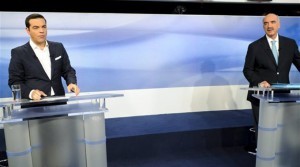All eyes were on the Greek political leader’s debate that took place on Monday, ahead of the snap elections set for September 20. With polls showing that neither of the two rivals are likely to secure a majority, both Radical Left Coalition (SYRIZA) leader Alexis Tsipras and conservative main opposition New Democracy party head Vangelis Meimarakis wary of alienating voters.
The debate on public broadcaster ERT TV was a chance for the two leaders to win over undecided voters, but both leaders had a defensive stand that lead to centrist Potami leader Stavros Theodorakis refering to it as a “debate of nothing.” He said, “I don not think that somebody won in the debate. I think they both lost.”
The general view is that the debate was not instrumental in determining the result. Little was said to convince loyal party voters to switch allegiance with most of the debate aimed at playing for undecided voters. Meimarakis refered to “protest voters” who helped SYRIZA rise to party in the January 25 elections.
SYRIZA had won in January, but called the snap election for September 20 after the Tsipras secured a multi-billion-euro bailout with tough terms last month. The harsh austerity deal, signed after a July referendum, saying “No” to austerity was voted on with the support of parliamentarians belonging to all paties except SYRIZA’s Left Platform, Golden Dawn and the Communist Party of Greece. The vote led to a split in the ruling party.
Now, Meimarakis is pushing for a “national team” that would lead to government unity and a “national negotiating team” for Greece’s bailout. On his part, Tsipras believes that ND and SYRIZA had “fundamental differences” that would render a national unity government impossible.
At another point in the debate, Meimarakis attacked SYRIZA for crippling the country’s economy by driving away foreign investors. He said that his party would “smooth the corners” of the bailout’s austerity measures but the fundamental points of the contract would remain in tact. “We won’t ease anything unless we implement most of what the bailout says at least in the first year: reforms, privatizations,” he said, adding that it is not Europe’s intent to “kill” Greece.
Tsipras, too, promised to honor the bailout agreement “as soon as possible, fighting on the issues that lie ahead but also by making reforms at home.”
Ask me anything
Explore related questions





